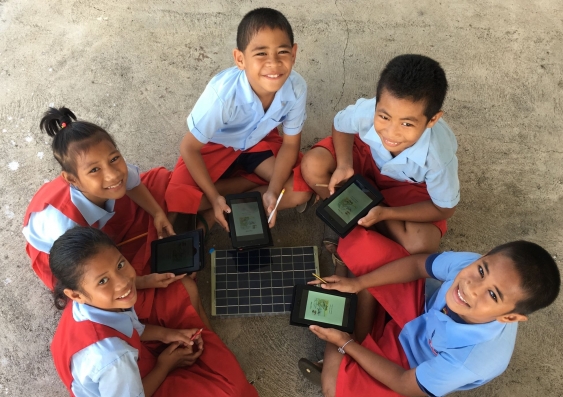Dr Laura Hosman discusses how her world-changing solar-powered digital library will bring education to remote global regions.

Students use the SolarSPELL technology. Photo courtesy of SolarSPELL
Dr Laura Hosman, Associate Professor, School for the Future of Innovation in Society at Arizona State University and winner of the 2017 PLuS Alliance Prize in Education Innovation is transforming global education with the Solar Powered Educational Learning Library (), a solar-powered library that can fit into a backpack.
During a recent visit to the Kirby Institute at UNSW, Dr Hosman discussed her research on the role of information and communications technology (ICT) in developing countries, particularly in terms of its potential effects on socio-cultural factors, human development, and economic growth.
is a solar-powered educational learning library designed to deliver curated content to remote, unconnected or off-grid regions. This portable solar-powered digital library broadcasts over a Wi-Fi hotspot, transforming access to educational opportunities in the most resource-constrained conditions. It bypasses the infrastructural requirements and costs associated with providing both electricity and Internet connectivity. Through the SolarSPELL initiative, teachers, health care providers and Peace Corp volunteers are trained in its use to help others develop the relevant Internet-ready skillset.
On winning the PLuS Alliance Education Innovation Prize of $25,000 Dr Hosman commented “It’s certainly been helpful to be able to mention this award when talking about . I invested the prize funds right back into the initiative. I would say that this allowed me to bring more students to the field as a part of the project work, which is a priority for me.”
Following her recent lecture at UNSW, “On the brink of the internet” Bisi Olulode (BO), PLuS Alliance Communications Officer asked Dr Hosman (LH) about her work to bring the internet to the far corners of the globe. The PLuS Alliance is a collaboration involving Arizona State University, King’s College London and the UNSW Sydney to solve global challenges around health, social justice, sustainability, technology and innovation.
BO – What was the inspiration for ?
LH – Although the first SolarSPELLs went to the field in 2015, the idea for an offline, rugged, solar-powered digital library developed and evolved from lessons learned from being out in the field and seeing what the true challenges were for teachers and students, from about 2010-2015. I originally had wanted to see why so many “technology in schools” projects around the world weren’t successful. I gained quite a bit of insight from going into the field and talking with teachers about this, and I learned a lot. But I found that I was learning even more by trying to help address some of the challenges these teachers had told me about.
BO – How did you get your students involved?
LH – I started teaching team-based, project-focused classes that were designed to be very hands-on. I was able to involve my students in this work from the very beginning. In about 2010, I first began presenting my students with a real-world challenge and incentivizing them by telling them “and we’re going to deliver what you’ve been working on this semester, to our partners in the field, at the end of the semester.” When we did this, there were always some aspects of what we were doing that were successful, and some that were failures. The library is a result of learning from those failures.
BO – What was the biggest revelation during the development phase?
LH- It “takes a village” to develop a library! The technology and hardware must work, and so we had to get that part right, but that is just the first step. A library needs to have content that is useful, relevant, and interesting for the users. We’ll never be done improving it, because a library is never finished. We’re always looking to improve every aspect of the library, including the hardware, software, content, training we give to new library users, and impact evaluation.
BO – How many countries are using and how many is that in students numbers?
LH – is being used in 8 countries including Fiji, Rwanda, South Sudan and Tonga. It’s less straightforward to count how many students are using the library, because the library is offline and is designed to be completely free to use the open access materials. We’ve estimated that has reached between 10,000 – 20,000 students.
BO – What are the plans for ?
LH – To continue expanding around the world. There are three main areas of emphasis over the next few years:
• Launching Health this year (a health-focused version of the library) that can be used by health practitioners in offline locations
• Launching in refugee camps and settlements in East Africa, with a goal of introducing it in refugee situations around the world.
• To continue working with US Peace Corps volunteers and expanding our work with the Peace Corps around the world.
BO – What role can play in addressing global health issues?
LH –







